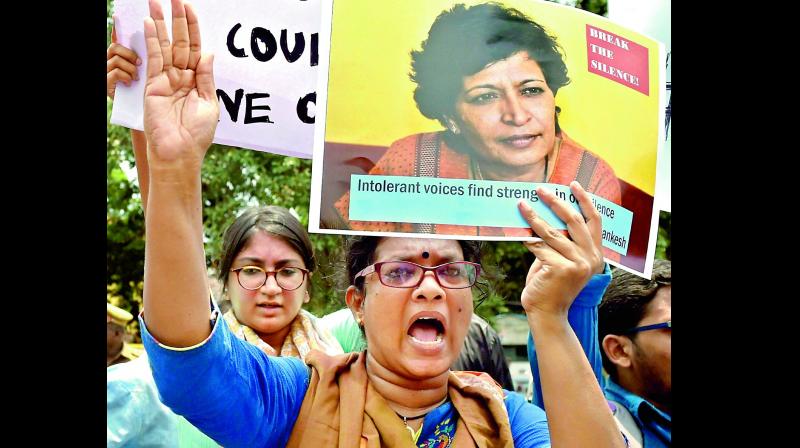Why I'm crying now'
Gauri and I became friends at National College in Basvanagudi, says Prakash Belawadi.

I met Gauri Lankesh in National College, where we studied together. IOur parents were very public figures: she was the daughter of P. Lankesh, an icon and a man I absolutely worshiped. My father, Belavadi Nanjundaiah Narayan, was in the film industry, my mother was an actress. Perhaps that's what brought us together in the first place. We were both lost, slightly bewildered children.
Gauri and I became friends at National College in Basvanagudi. I became an engineer and worked as one for a while before I turned to journalism, where we reconnected. Gauri was married to Chiddu (Chidanand Rajghatta) by this time and he was already a very successful journalist. She was writing for the Times of India too and we became friends - Nupur Basu, Chiddu, Srinivas Prasad - it was a large group.
She was a different person in those days, we would party together all the time. Yes, we had our share of scraps but they were never more serious than small professional rivalries and they never went beyond the office. Besides, her father was a legendary figure, the architect of new cinema, journalism, poetry and political thought - we were all devoted to him. Writers, critics and journalists would congregate at the Lankesh Patrike office and we would land up too, sitting there, open-mouthed, in the presence of these tremendous personalities.
When he died in 2004, the habit of turning up at Lankesh Patrike died also. The gang dispersed and moved to different places. Gauri had taken over Lankesh Patrike and it had transformed her completely. The rest of us carried on with our partying ways, but Gauri was at Baba Budan Giri. She went from being a member of the gang to an intellectual, the editor of the Kannada paper that had transformed journalism in the state.
This was when our differences began to surface for I have never understood identity politics. We had an argument and I sulked. We reconciled in the winter of that year, when Radhika, another of our friends, threw a party at her house. I thought then that our political views had ceased to matter. Obviously, I was wrong.
What we need to look at here is the pattern that has begun to emerge. Even those who identify with the right wing cannot afford to miss these, for Gauri's death falls in line with a series of killings, including that of Dr. M.M. Kalburgi. All of these writers were left-leaning and stood up against something. It's obviously suspect and the obvious needs to be investigated.
To me, the loss is personal. I did try to caution her during the Baba Budan Dargah crisis when she aligned herself with members of the extreme left. When the BJP government came to power I told her that their rhetoric might be harsher and punishments stricter but it seemed the rift between us had grown too wide to bridge. She may not have lost faith in me as a friend but she was too angry to listen.
Today, I sit here asking myself why I didn't reach out to Gauri, to my friend. I should have tried harder. We took different sides but how does that matter anymore? I wish I could change these things but I can't. And it's too late now.
The writer is a well-known actor and activist

